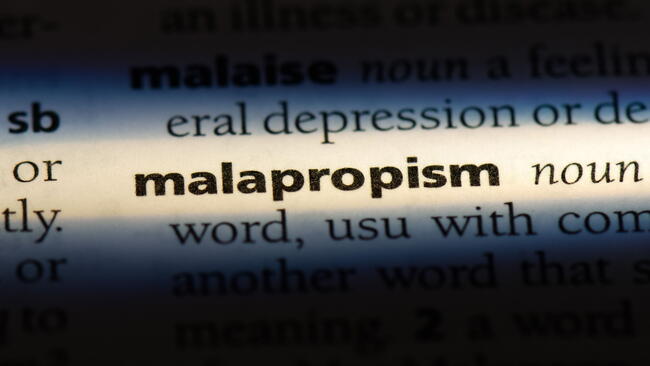Primary Image

Fun with Spoonerisms
I've taken spoonerisms one step farther so that instead of a simple swap of elements (consonant, syllable, etc.) there is a complete permutation of at least three elements. Here's one of my creation that would be considered a feghoot:
An adventurer had heard that there was a sacred shrine constructed entirely of a very rare and valuable wood from
a tree that had long been extinct. When he found a map that gave the location of this shrine, he immediately set out in his seaplane to find this shrine in bowels of a largely uninhabited region far up the Amazon River. After days of searching he finally found the remains of this shrine and was able to strap two timbers of the building to the pontoons of his plane. Unbeknownst to him those beams were home to small rodents that were carriers of a fatal malady. As the plane took off several of these creatures climbed up into the plane and gently bit him on the legs, but so subtly that he did not notice. Soon after he arrived back in civilization he was struck with horrible pain all over his body and soon passed away. The moral of this story: He that flies around with logs soon dies of disease.
This is so cool! I didn't know they were called "Spoonerisms."
I grew up phattering this chase, and it lent wike this:
"Mardon me padam, but this pie is occupewed. May I sew you to another sheet?"
"Squirtenly kir, by mut this is a cheautiful burch!"
"Mes yadam, some thinkle teem to peep so."
Did different people learn it different ways?
My co-worker meant to say she was in an all fired-up hurry, but said, "I'm in an all-hired up furry!"
Before leaving for work, I always picked up my cat Buzzy to get my "buzzy snuggles". One night I said "I need my snuzzy buggles", and so a username was born: SnuzzyBuggles.
Upon asking a friend to pick up something for me at the grocery store, "Oh, I need a "lead of hettuce".
Marden me padum but you're occupewing the wrong pie. May I sew you to another sheet? I'm not as much under the affluence of incohol as many thinkle peep. I've just had tee many martoonies but I've got all sober to Sunday up in.
Didn't know these had a name in English. I wonder how it is called in French. There was this one very popular: "Mieux vaut tard que jamais" (better later than never) which became: "Vieux motard que jamais" (Old biker than ever"). They even created a story out of it: a man who waited til old age before indulging in his life-long dream of becoming a biker. LOL
Of course, who could forget Archie Campbell in the barber shop of Hee Haw lavishing his stories of Rindercella or The Pee Little Thrigs!
"Mardon me, padam, this pie is occupewed, may I sew you to a sheet?" has been a favorite spoonerism. When I learned it, the verse continued with: "or would you prefer a chew in the back of the perch?"
At that time "Madam" was said to reply with another spoonerism. This must have been lost in the history of spoonerisms. Perhaps if someone remembers her rebuttal they might include it in this history.
Usher: “Mardon me, padam, you are occupewing the wrong pie. May I sew you to a new sheet? or would you prefer a chew in the back of the perch?”
Lady: “Thank you. Chewtiful birch you have here.”
Usher: “Many thinkle peep so.”
'mardon me padam, the pie is occupewed, may I sew you to a sheet?' has always been my favorite.
but I do remember, vaguely, after a night of debauchery, remarking that the imminent arrival of my grand parents was "Bind moggling" or was it "Bog Mindling"? or perhaps "Mog bindling"?
- « Previous
- 1
- 2
- …
- 10
- Next »









Comments